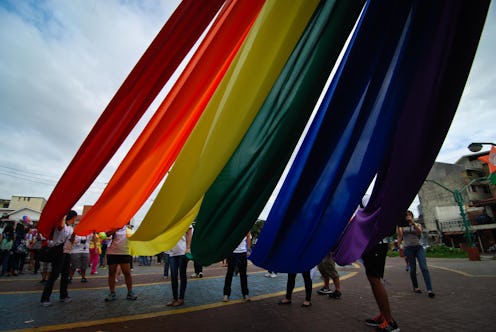In one southern Mississippi town, a bullied gay teen is fighting back. The Moss Point School District, in Jackson County, Miss., was sued Tuesday for allegedly not doing enough to prevent the anti-LGBT bullying of the district's students, and in particular, Destin Holmes of Moss Point High School. The Southern Poverty Law Center, a civil rights organization, filed the suit on behalf of Holmes, who was allegedly subjected to sustained bullying at the hands of students and staff.
The lawsuit claims the Moss Point School District violated Title IX of the Education Amendments Act of 1972, which seeks to end gender discrimination in schools, in addition to the violation of Holmes' equal-protection rights. Holmes is openly gay, and her principal, according to a report by PolicyMic, told her, "I don't want a dyke in this school."
After an onslaught of bullying, Holmes left Magnolia Junior High School to be home schooled, but returned to the school district as a student at Moss Point High School a year later. Though Holmes spoke to teachers about being harassed, she says nobody helped her.
But Holmes' reports of bullying did prompt an investigation by the Southern Poverty Law Center into the "rampant harassment" of LGBT students in the school district. The report indicated that LGBT students were being targeted by students and staff because of their decision to eschew traditional gender stereotypes, and because they were perceived to be gay.
And it wasn’t just Holmes who was on the receiving end of slurs and threats: according to the report, an openly gay male student, who later attempted suicide, was afraid to use the restroom after being physically attacked and called “faggot,” and a transgender student was frequently referred to as “it” by teachers and students alike. The report concludes that the Moss Point School District did not take action, even though the Southern Poverty Law Center demanded they did so.
Moss Point School District released a statement yesterday stating that it wouldn't comment on the lawsuit, and claimed that, actually, it hadn't been served with the suit. They added that it was the "highest priority" of the district to prevent the bullying of its students, and didn't respond to Bustle's request for further comment.
Holmes' story first attracted national attention in March when she attended a Southern Poverty Law Center-organized press conference. She described the incidents of bullying she was subjected to: she said she'd been referred to a “queer,” “dyke,” and “freak” by her fellow students and teachers, who wouldn’t let her use the women’s restroom. In a video from the Southern Poverty Law Center, Holmes speaks about her experience at school.
For now, the fight for gay rights in the state shows little sign of improving. In Mississippi, only 13 percent of residents approve of gay marriage. And in November, the town of Shannon, Miss. banded together to prevent a gay bar from opening, despite the town having LGBT-friendly bars in the past.
The prevalence of LGBT bullying in schools prompted the Department of Education to suggest in June that schools collect data on bullying based on sexual orientation, which would join gender, race, disability, and national origin as personal characteristics protected under federal law.
Eighty-four percent of LGBT students have reported verbal harassment, and 65 percent have experience sexual harassment, according to data from Lambda Legal, an organization that works towards full civil rights for LGBT women and men.
The Southern Poverty Law Center have an comprehensive guide for LGBT students and their rights posted on their website. The It Gets Better Project, a group that supports the rights of LGBT youth, has positive video testimonials from people living in Mississippi and elsewhere in the country.
